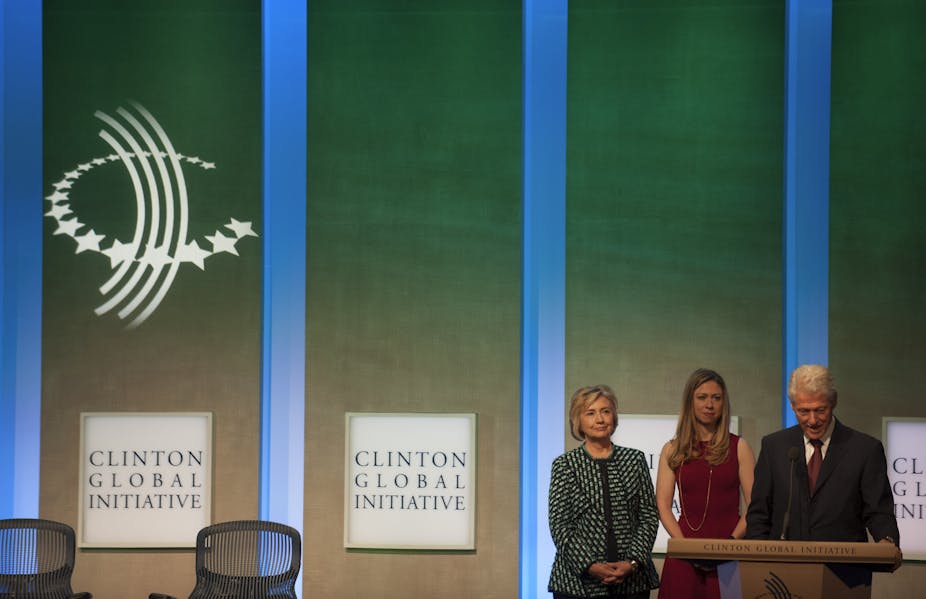If Donald Trump has stunningly high disapproval ratings, Hillary Clinton isn’t far behind. For all that this year’s presidential election was once supposed to be a coronation, it’s become clear that the electorate mistrusts the woman Donald Trump calls “Crooked Hillary” – and that mistrust could yet derail an otherwise ideal opportunity to continue the Clinton dynasty.
Given her negative image, Clinton may struggle to capitalise on the even greater distrust and disapproval of Trump. An issue that has raised questions about Hillary’s credibility is the Clintons’ deep and enduring corporate financial connections.
According to a Washington Post investigation, the Clintons’ political campaigns and charitable foundations, most notably the Bill, Hillary and Chelsea Clinton Foundation, have received in the region of US$3 billion in donations over the past 40 years. A network of organisations and charities aiming to empower women and girls, assist economic development, and save lives, the foundation is estimated to have raised somewhere in the realm of US$2 billion dollars, about two-thirds of the Clintons’ four-decade fundraising haul.
This funding for “good causes” has been coming in since 1997, when Bill Clinton began fundraising to build the Clinton Presidential Center in Arkansas. Since then the foundation’s remit has widened to a host of initiatives, including the Clinton Global Initiative, among others. And the list of the Clintons’ philanthropic associations runs long.
The Clinton Foundation’s “strategic partners” include various banks and financial institutions – Barclays, Deutsche Bank, HSBC and Goldman Sachs among them.
Pitching in
The foundation’s actual practices in its work have come in for a lot of scrutiny. In particular, its apparent generosity in earthquake-hit Haiti since 2010 was undermined by the saga of the temporary shelters it donated for use as school rooms and temporary housing. An investigation by The Nation found that temperatures in some of the shelters had reached over 100ºF (35ºC) and that some of the children who spent hours inside them suffered severe headaches and other illnesses.
The investigation also indicated high levels of formaldehyde, a known carcinogen (and, according to the US Centers for Disease Control and Prevention, also a cause of asthma and other lung diseases) in one of 12 trailers tested. They were manufactured by Clayton Homes, which is being sued by the Federal Emergency Management Administration for having allegedly provided formaldehyde-laced trailers to victims of Hurricane Katrina.

Clayton Homes is owned by Berkshire Hathaway, a holding company owned and controlled by billionaire Warren Buffett – an early and high-profile member of the Clinton Global Initiative and longtime Clinton campaign donor.
Bad feeling
So what political consequences might all this have for Clinton’s presidential bid?
It’s likely that allegations regarding the foundation may deter a proportion of Bernie Sanders’s supporters from voting for Clinton in November. Sanders himself has now endorsed Clinton, much to the chagrin of his more loyal voters, and he hasn’t focused too much on the Clinton Foundation. But when pressed in a CNN interview, he did open up somewhat: “If you ask me about the Clinton Foundation, do I have a problem when a sitting secretary of state and a foundation run by her husband collects many millions of dollars from foreign governments, governments which are dictatorships … do I have a problem with that? Yeah I do.”
On the Clinton Foundation’s receipt of tens of millions of dollars from assorted foreign governments, including Saudi Arabia, he said: “You don’t have a lot of respect there for opposition points of view for gay rights, for women’s rights.”
An air of distrust has hung over the Clintons and their foundation from the very beginning. And heading into the general election, Hillary Clinton and her campaign may find it hard indeed to shake off.

